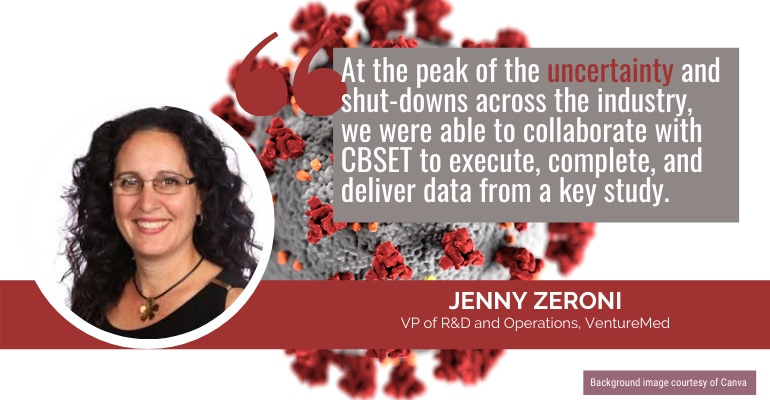March 10, 2021

One year ago — March 11, 2020 — the World Health Organization declared the novel coronavirus (SARS-CoV-2) outbreak a global pandemic. With that declaration came the realization that our world would be forever changed by COVID-19. As a medtech journalist one thing that has kept me going over the past year is the resolve and ingenuity of this industry. Every day my inbox overflows with incredible stories about companies that have risen to overcome the challenges of this pandemic rather than succumbing to them. Throughout the month of March, MD+DI will be taking a look back at the inspiring ways the industry has persevered over the past year. Below is one such story.
VentureMed was on a roll ... then COVID-19 hit
Prior to COVID-19, VentureMed was on a roll. The Minneapolis, MN-based company's first-generation Flex Vessel Prep System had demonstrated promising clinical performance following FDA clearance and the company was preparing to introduce an improved second-generation device.
"It was important for us to clearly demonstrate our device’s mechanism of action and the potential for Flex to optimize the delivery of drugs from drug-coated balloons (DCBs) to atherosclerosed peripheral arteries,” said Jenny Zeroni, vice president of R&D and operations at VentureMed. "
Vessel preparation in peripheral artery disease (PAD) has been hypothesized to improve drug uptake from DCB therapies, and VentureMed was motivated to prove this theory using its Flex system. Unfortunately the challenges of COVID-19 — travel bans, furloughs, restricted access to hospitals and laboratories for clinical researchers, not to mention social-distancing measures — made doing so a bit tricky.
To keep the project on track, VentureMed contacted CBSET to see if they could execute a study via livestreaming, as VentureMed personnel and their physician advisors were unable to travel due to COVID-19. Lexington, MA-based CBSET is a non-profit organization dedicated to research, education, and the advancement of early-stage technologies.
"Pre-clinical research was hit because of logistics … it became survival of the fittest," Rami Tzafriri, PhD, director of innovation and research at CBSET, told MD+DI. “[COVID] penalizes everyone who wasn’t well prepared or wasn’t efficient, and it benefits the few that either were especially efficient or were ahead of the curve in anticipating some of the benefits of the digital era.”
But as the old cliche goes, where there's a will, there's a way.
"VentureMed and CBSET both were prepared to adapt and function in this new and challenging environment by continuing development in a more virtual way, modifying operations and building relationships in new ways,” Zeroni said. “At the peak of the uncertainty and shut-downs across the industry, we were able to collaborate with CBSET to execute, complete, and deliver data from a key study. The structure at CBSET, together with the talent and flexibility of the CBSET team, allowed the VentureMed and CBSET teams to design and execute a complex study virtually, and deliver successful results."
Working in VentureMed's favor was the fact that the simplicity of the Flex technology made it particularly well-suited to remote training. Consequently, VentureMed was able to leverage not only the experience and expertise of the CBSET staff and the sophistication of the CBSET laboratory and technology, but also CBSET’s willingness to be trained on use of the technology and work remotely to conduct the study. Thus, a combination of livestreaming meetings used for product training, along with a simple, easy-to-learn device, all contributed to the successful and timely completion of a complex pharmacokinetic drug uptake study.
“Human clinical studies provide limited insights into the mechanisms of action and no ability to measure local drug delivery. Previously, using a human cadaver model, we demonstrated that the Flex Vessel Prep System delivers an array of micro-incisions in calcific human arteries and designed an animal model of the disease to the ability of Flex to successfully enhance local drug delivery,” Tzafriri said. “The results of this study provide the first compelling evidence I have seen of a vessel preparation device that enhances drug (paclitaxel) uptake after DCB treatments, and moreover, with minimal vessel trauma."
About the Author(s)
You May Also Like



.png?width=300&auto=webp&quality=80&disable=upscale)
